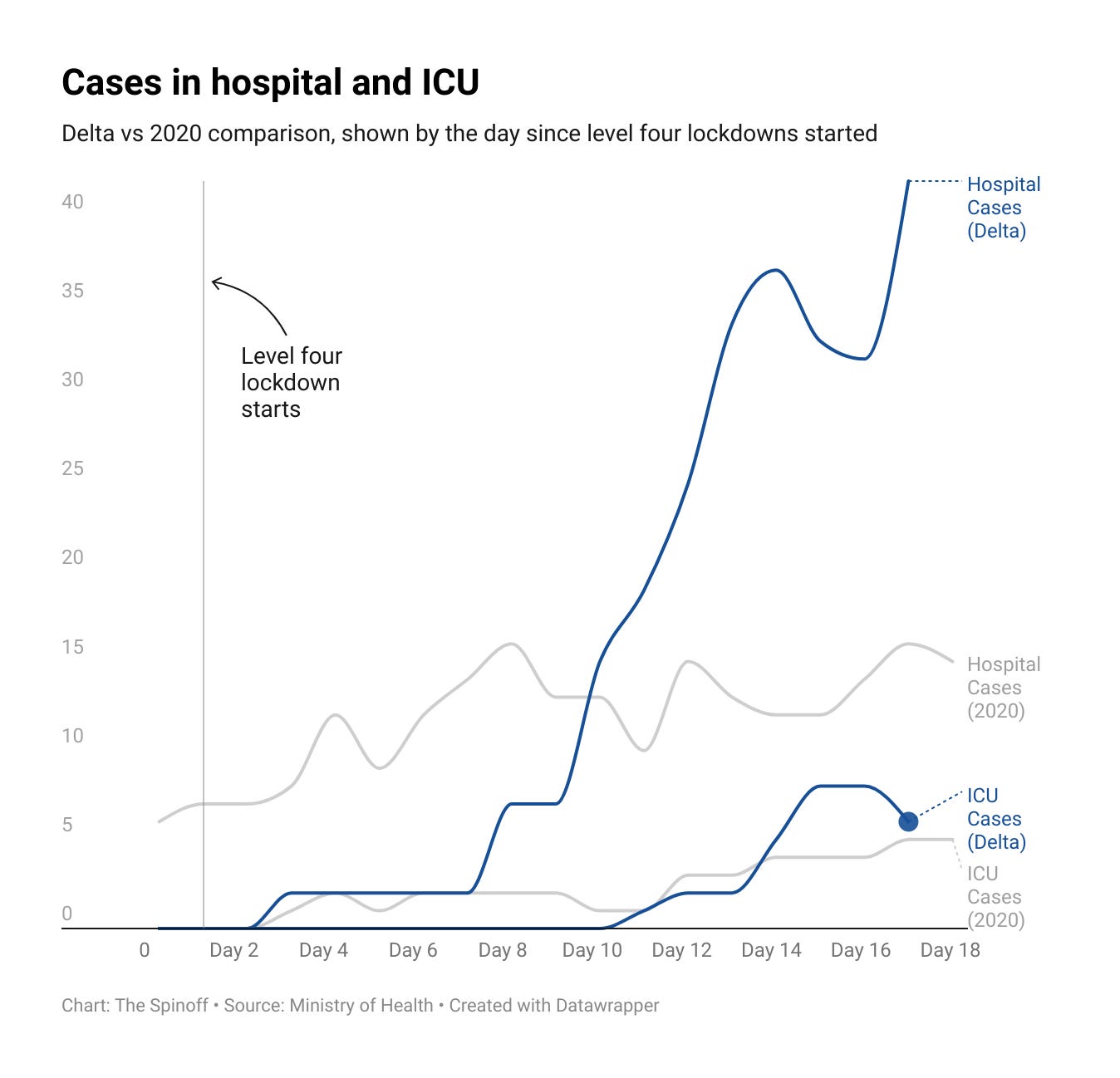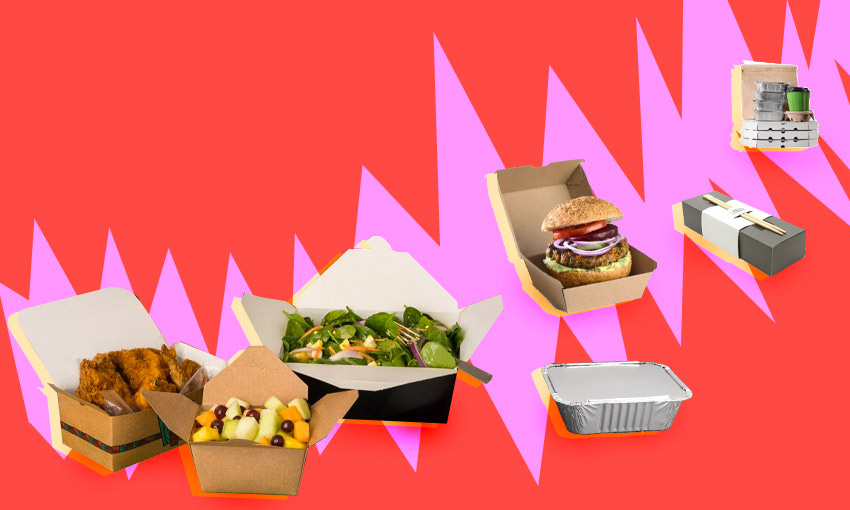Covid-19 cases soar in hospitals
Reflecting the greater severity of the delta variant, hospitalisation numbers are growing much faster than during the first wave.
Good morning and welcome to The Bulletin for Friday, September 3, by Justin Giovannetti. Presented in partnership with Z Energy
In today’s edition: Auckland’s hospitals ask for help as they face a wave of patients, a look at the situation in South Auckland and an escape from quarantine.
Auckland Hospital and Starship Children’s Hospital (Phil Walter/Getty Images)
Delta is a different virus. There have been warnings for months that the delta variant of Covid-19 is a greater worry than the original strain of the virus. It's highly contagious, more so than the common cold, and makes cases infectious much more quickly. Unfortunately, the variant also leads to higher rates of hospitalisation.
A fast rising line. One of the charts I’ve been watching in recent days is the growing number of hospitalisations in Auckland due to the delta outbreak. Compared to the first wave of the virus in early 2020, the numbers are soaring. There are now 42 people in hospital compared to 16 at the same point in the first wave. The figures for intensive care are slightly better, with six cases in ICU yesterday, half of whom were on ventilators. At this point in the first wave outbreak there were five cases in ICU.
“A stark reminder”. That’s how Ashley Bloomfield described the growing number of hospitalisations yesterday, according to Newsroom. People in ICU were stable, though as Bloomfield noted, “they can be stable but quite unwell”. The youngest person in the group is 18 years old. Unlike the first wave, delta has so far sent a number of much younger patients to hospital.
You’re twice as likely to become hospitalised with delta. There’s increasingly solid evidence about how virulent delta is, according to Micheal Plank. He’s a professor at the University of Canterbury and the principal investigator at Te Pūnaha Matatini, a group that has been integral to modelling Covid-19’s spread in New Zealand.
“Data from overseas has shown that delta is more severe and it carries a higher risk. There’s one study that just came out last week that estimates that delta has more than double the hospitalisation rate compared to the alpha variant,” he told The Bulletin. The BBC wrote about that study.
A helpful reminder at this point is that alpha used to be known as the UK variant. Alpha itself might be more virulent than the virus first detected in Wuhan.
There are two issues to watch with the hospitalisations. The numbers only tell part of the story. The delta outbreak has predominantly impacted the country’s Pacific community. A group that is at higher risk of needing more treatment if becoming sick. Why? “Structural factors stemming from colonisation and racism in the health system,” said Plank.
Then there’s the age of people becoming sick. Because many of the country’s older residents have been vaccinated, something which still does an excellent job of protecting people against Covid-19, delta is impacting the young. “The health burden is being shifted from older groups to younger groups. That’s not necessarily a bad thing, but it’s something to watch,” he said.
The impact on the healthcare system. Auckland’s hospitals put out a call for more ICU nurses from across the country on Tuesday night. One News reports Bloomfield as saying that the call was planned to help ensure there are a group of nurses dedicated to looking after Covid-19 patients. Nurses themselves have said their morale is low and there’s a very limited pool to draw from. Middlemore, Auckland City and North Shore hospitals have begun building negative pressure rooms to care for the growing number of cases, according to RNZ.
The cautionary tale is across the ditch. In New South Wales, the number of hospital patients has soared by 42% over the past week, the Sydney Morning Herald reports. There are now 917 Covid-19 patients in the state’s hospitals and surge plans have been put into place to deal with a growing wave of cases. The peak isn’t expected until next month. The state also highlights how Covid-19 can make a bad situation worse, with 1429 healthcare workers currently isolating, taking away capacity when it is most needed.
The Spinoff is doing our utmost to keep you updated on Covid-19 related news through this outbreak. Every dollar our members contribute directly funds our editorial team and is devoted to ensuring we do more. Click here to learn how you can support the team today.
The Covid numbers: 49 new community cases were reported yesterday, all were in Auckland. 36% were active in the community while infectious. The number of new daily cases is declining quickly. 736 cases have now been detected in the delta outbreak. 89,546 people were vaccinated yesterday.
The situation in South Auckland. There was no freedom day this week, instead the end of level four lockdown was greeted as “coffee day” in Wellington. Flat whites and bags of Macca’s popped up in selfies across the city. The situation is quite different in South Auckland, as reported by my colleague Justin Latif. The area has done incredibly hard lifting for this country through Covid-19. With an extended lockdown, food banks are preparing for a surge in demand.
I asked Justin, who has reported on the area for a decade, what he’s seeing around him.
The weight has fallen on his neighbours.
When the lockdown began, there was a palpable sense of relief from those I spoke to that the outbreak was on the North Shore rather than back in South Auckland. But that has obviously changed dramatically, to the point where every supermarket near my home in Māngere is a location of interest. Now there’s a sense that the virus is closing in on us, which adds an edge of anxiety to how you move around the shops.
My sense is that people are generally resigned to their lockdown routines, rather than feeling gripped with panic as some were in previous outbreaks. There are definitely those who have been impacted by loss of income, but people also know where they can get help. Those providing support have their online and contactless systems already in place and ready to go.
What are you hearing about vaccine interest?
It seems to me, anecdotally, that there is a lessening of the conspiratorial and anti-lockdown sentiment. I’ve heard South Auckland has had a drop in lockdown breaches compared to previous lockdowns. Poor vaccine uptake was as much to do with people not taking Covid seriously as it was finding the booking process too much of a hassle. Now I’m hearing people are much more positive about getting the vaccine, and having a lockdown seems to have given people the time, coupled with the extra motivation that comes knowing the virus is very much present in the local community.
What's the need for support at this point?
The obvious answer would be to suggest food bank donations, but we already have a fairly well-organised food network in this country which keeps our food banks pretty well-stocked. Instead, I would suggest people speaking up against any antagonism towards this region. South Auckland and its residents come face to face with the virus more than any other community by virtue of its location and the types of jobs many of our people hold, so people are sick of the racism and general snobbery directed towards this area.
An escape from quarantine. Tova O'Brien has one of those stories that makes you cringe. According to the Newshub political editor, a man who allegedly escaped an Auckland quarantine facility had earlier breached an isolation order to stay home after testing positive. He spent more than 12 hours in the community while on the run and the government failed to note the escape and recapture during yesterday’s press conference.
The man livestreamed his unusual arrest, sharing anti-vaccination conspiracy theories as officers in full PPE tried to place him in a van. Toby Manhire reports on the footage for The Spinoff. The man’s main claim is that he should not quarantine as he has no symptoms, despite his positive test. Asymptomatic cases can still spread the virus.
An exemption for kiwis. After five kiwi were killed during the 2020 level four lockdown, the Pūkaha national wildlife centre got an exemption this time to keep trapping and keep the birds comfortable through level four. As reported by the Wairarapa Times-Age, the centre's general manager said the kiwi population just couldn't deal with a second wave of predators. Along with stoats and ferrets, the crews kept a fluffle of wild rabbits away. While the birds got an exemption, Rocket Lab didn’t, according to Stuff. The big rockets will wait until level three.
The greyhound racing industry is in trouble. The government has put greyhound racing “on notice” that it has a year to clean up its act, RNZ reports. While the punishment for inaction isn’t written out, the words used by racing minister Grant Robertson are that the industry will “cease to have social license”. That’s the kiss of death and a shut down would likely follow. Interestingly, a review of the industry concluded that it is its own worst enemy, obfuscating requests and refusing to release what might be helpful animal welfare data. It can hide no longer.
Got some feedback about The Bulletin, or anything in the news?
Get in touch with me at thebulletin@thespinoff.co.nz
(Tina Tiller)
Right now on The Spinoff: A guide to level three takeaways, covering the motu from Hamilton to Dunedin. Level three is about way more than KFC. Tara Ward ranks politicians who have engaged in the grand tradition of holding things. Justin Latif reports on how the Assemblies of God church at the centre of the delta outbreak is bracing for bad news. Bernard Hickey’s podcast this week makes a case for mandatory vaccination at work. Simon Pound reports on a New Zealand startup behind a new generation of better batteries.
Pregnant and chasing a Paralympic medal. Lora Webster is five months pregnant and on the volleyball court in Tokyo chasing a medal, Stuff reports. The 35-year-old American explains that when she dives for the ball, she has to be conscious not to land on her stomach. Easy as in a gold medal game, without a left leg. This is the second time she’s been pregnant at the Paralympics and the third time during competition. All of this paints the picture of an incredibly resilient athlete.
That's it for The Bulletin. If you want to support the work we do at The Spinoff, please check out our membership programme.








